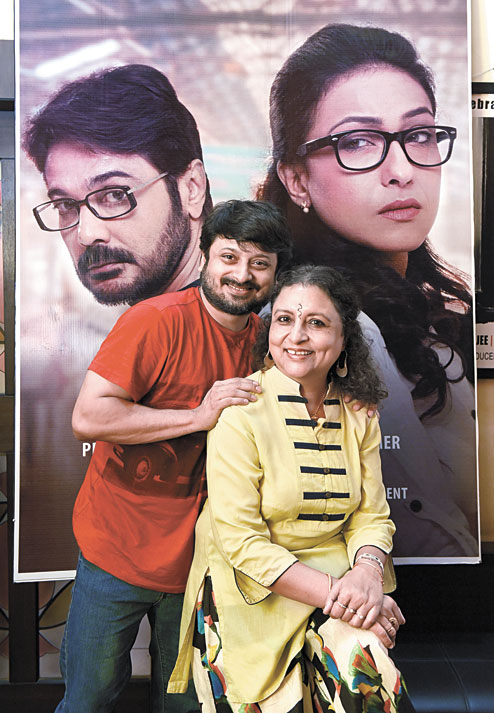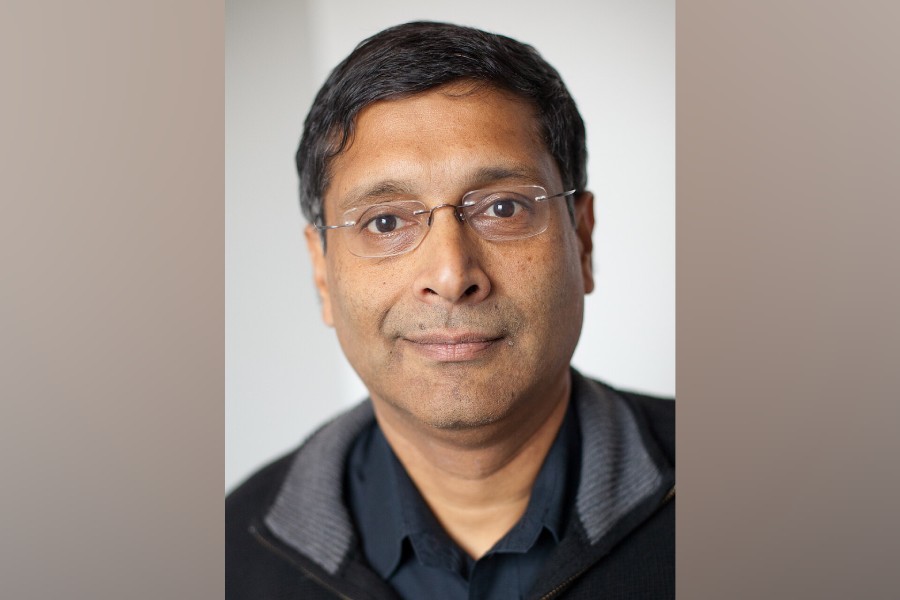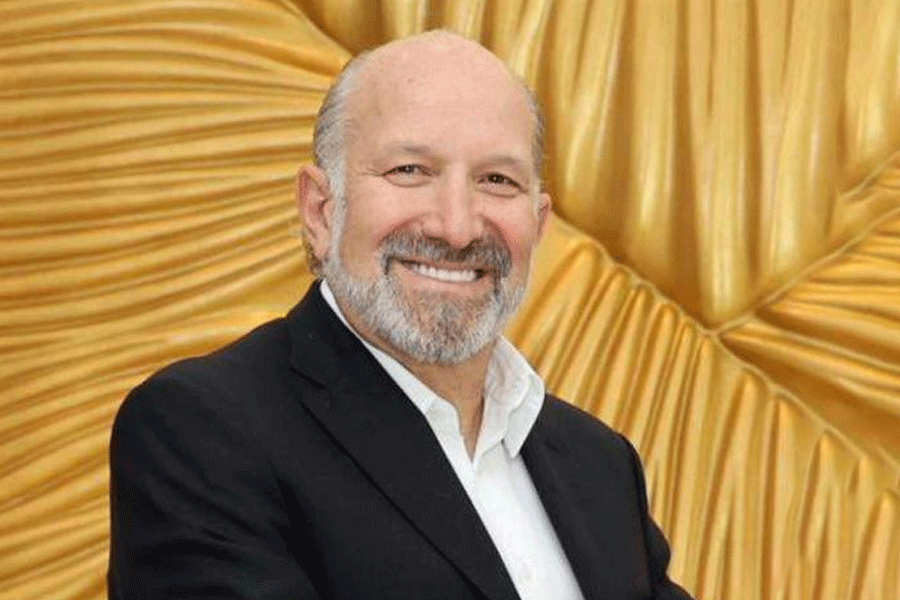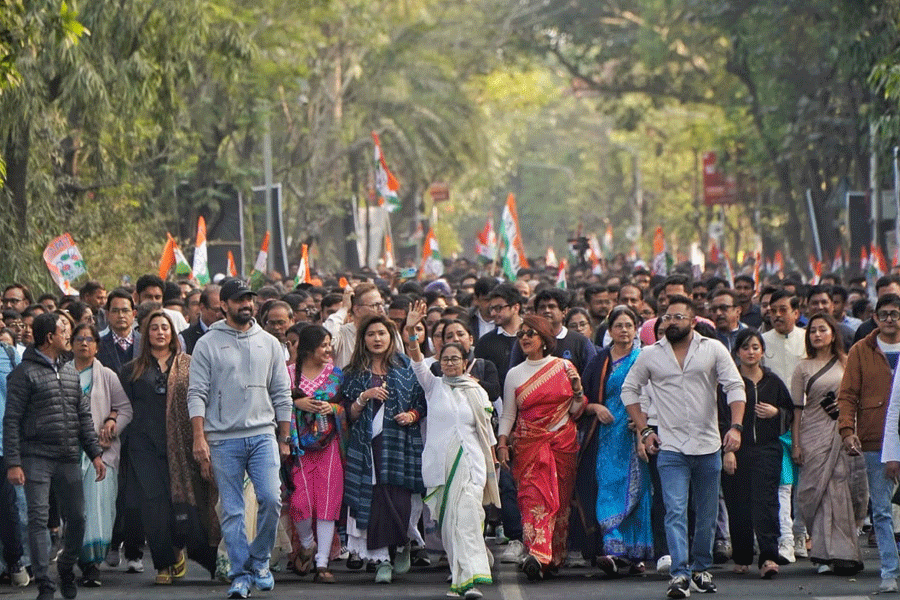
They’re the directors with the golden touch. Shiboprosad Mukhopadhyay and Nandita Roy have done it once again with their latest release, Praktan (Former) — that reunites Tollywood’s most popular romantic pair, Prosenjit Chat-terjee and Rituparna Sengupta, after a hiatus of 14 years. The movie has raked in Rs 6 crore in four weeks — a bonanza by Bengali movie industry standards.
The film — about how a former couple meet during a train journey — is having a dream run with packed shows in 90 single-screen and multiplex theatres in Bengal, and is a huge commercial success.
“We broke even in around 10 days,” beams Shiboprosad, who’s one-half of Tollywood’s most successful director pair today. Praktan was made with a budget of Rs 2 crore and Shiboprosad is confident that the film will make a business of at least “Rs 7.5 crore to Rs 8 crore”. That’s four times the budget, something that we see rarely in the Bengali film industry. “We’re confident Praktan will run for at least 100 days,” adds Nandita.
Spurred by its success, leading Bollywood film producer Mukesh Bhatt has recently bought Praktan’s rights and the film will soon be remade in Hindi. Says Bhatt: “Shibu (Shiboprosad) and Nandita are extremely successful directors in Bengal. And their works need to be brought to the national arena.”
.jpg)
.jpg)
Apart from Bengal, Praktan has released in 25 cities and is packing a punch with house-full shows in metros like Mumbai, Bangalore and Delhi.
What’s more, the film is also a hit with the Bengali Diaspora. “We are releasing Praktan in Germany, Singapore and Dubai,” says Shiboprosad. It was also released in nine cities in the US, “which is a never before number for a Bengali film,” he adds.
“This is the era of globalisation of good Bengali cinema,” says Nandita. And the blockbuster pairing of Shiboprosad and Nandita is leading from the front. Their 2015 smash hit, Belaseshe, too, released in the UK, the US and Singapore, and captured the attention of the NRI audience. The film that reunited actors Soumitra Chatterjee and Swatilekha Sengupta after 31 years — they were last seen in Satyajit Ray’s Ghare-Baire in 1984 — ran in
India for 250 days, an amazing run by today’s standards.
People who have been following Shiboprosad and Nandita’s cinematic graph won’t be too surprised with Praktan’s success. The directors with the Midas touch make “meaningful yet entertaining” cinema and in only five years almost all their films have garnered critical acclaim and raked in big moolah. That has turned them into a force to reckon with in Tollywood.
.jpg)
“Shibu and Nanditadi are a big success in Bengal today. Their films have an amazing connect with the audience,” says Rituparna, who has worked with the duo in four films.
Says veteran actor Soumitra, who has worked with the two in Praktan and Belaseshe: “They make films with a
lot of care. And they have an inherent understanding of human nature.”
But what makes the two directors Tollywood’s biggest newsmakers is the national impact their films are making. Apart from Praktan, Belaseshe too is being remade in a regional language. Says Shiboprosad: “Viacom has purchased the language rights of Belaseshe.”
.jpg)
That’s not all. The pair’s 2014 family drama Ramdhanu served as an inspiration for the recent Malayalam flick, Salt Mango Tree. The film will now “be remade in Gujarati and Marathi”.
“Shiboprosad and Nandita are in the forefront as far as catapulting Bengali cinema to the national arena is concerned,” says Nandu Ahuja, senior vice president, India Theatrical, Eros International Media. Eros has distributed Belaseshe and Praktan in India and abroad, and Ahuja terms the association as “highly successful”.
The duo is also in talks with Mumbai-based Essel Vision Productions for a new Bengali and Marathi film collaboration. Says Nandita: “We are trying to open fresh avenues for Bengali cinema in the national circuit. But other filmmakers too have to take the trend forward.”
It must be said that the directors have faced their share of brickbats. Despite its huge commercial success, Praktan, for instance, has been panned by a section of the audience. However, Shiboprosad says they are “extremely receptive to criticism” and try to learn from their mistakes. He adds confidently: “You can love us and you can hate us. But you can’t ignore us.”
Out of the eight films the pair has directed so far, six have been box office successes and won praise from the critics. So what’s the magicingredient? “There’s no formula as such. We make films about subjects that strike a chord,” says Nandita. However, a major ‘formula’ that’s clearly visible in the duo’s films is strong content. “Yes, content is the mother of our films,” agrees Nandita, who — along with Shiboprosad — writes the scripts of their films.
.jpg)
.jpg)
.jpg)
Take Belaseshe, for instance, which told a story about how an ageing man contemplates divorce and, in the
process, rediscovers his marital bond. The film is considered one of the most successful Bengali films in modern times. Says Nandita: “Belaseshe was a big milestone in our career.”
While Icche (2011) told a story about the relationship between an obsessive mother and his son, Muktodhara (2012) was about how prisoners are reformed in a correctional home. Ram-dhanu took up the perils of getting admission in schools. Owing to the rich stories that they told, Icche, Muktodhara and Ramdhanu have been included in the B.Ed curriculum at Visva-Bharati University, Santiniketan.
“Shibu and Nanditadi’s films mirror human emotions. They appeal to the masses as well as the classes,” says Rituparna, who the directors see as their biggest “star support”.
Shiboprosad-Nandita certainly seems to have their fingers set tightly on the pulse of the audience. The duo’s movies deal with subjects that the common man can connect to instantly. While Accident (2012) was inspired by a major road mishap in Calcutta, Alik Sukh (2013) dealt with the raging debate about medical negligence.
Says Nandita: “We try and deliver social messages in our films without being preachy.”
.jpg)
Photo: Sudipta Banerjee
.jpg)
Another big draw for movie-goers is the unconventional casting in the duo’s films. A watershed moment in their career was when a real prisoner in a correctional home, Nigel Akkara, was cast as the lead in Muktodhara. “Producers laughed us off initially,” reminisces Shiboprosad. But Nandita stuck to the decision and Akkara went on to win laurels for his performance.
Casting theatre actors Sohini Sengupta and Debshankar Haldar in Icche and Alik Sukh, respectively, was a major call too. “Reliance backed out of Alik Sukh because of the casting,” says Shiboprosad. But both Sohini and Haldar’s performances were praised and it was a huge pat on the back for the directors.
“We don’t compromise with our casting,” says Nandita firmly. In fact, the directors had approached Prosenjit and Rituparna way back in 2002 with a script that was later modified into Praktan. Back then, the superstars had declined the offer due to personal reasons. “But we knew if we had to make the film, it would only be with Bumba (Prosenjit) and Ritu (Rituparna),” says Nandita.
Their connect with the audience is also due to the fact that they “pick up characters and stories from real life,” says Shiboprosad. While he thought of casting Sohini in Icche after watching a mother scold his son on a Calcutta street, Ramdhanu’s topic was picked up at a birthday party where everyone was talking about admitting children
in schools.
Apart from directing and writing their films, the duo also produce them. Their production house, Windows, was set up in 2000 and has made huge profits with films like Alik Sukh, Ramdhanu, Belaseshe and, now, Praktan.
Operating out of Nandita’s 60-year-old house in south Calcutta, the office of Windows is a small space with walls decked with posters of the duo’s films and racks displaying awards which they have bagged —Best Director for Alik Sukh at the Filmfare Awards (East), Best Bengali Film for Belaseshe at the Zee Cine Awards, and more.
There’s also a framed photograph of the directors with President Pranab Mukherjee. This was when Muktodhara became the first Bengali film in a decade to be screened at the Rashtrapati Bhavan.
Nandita says about Windows’s future plans: “We are looking to provide a platform for talented new directors, something that we never got.”
It sure wasn’t a cakewalk initially for the pair. Producers were unwilling to back Icche, which was written way back in 2003. But that did not stop the two from taking big risks. Says Shiboprosad: “Icche and Accident were almost shelved when we started doing research on Muktodhara in 2011.”
Finally, fortune smiled on them when Vignesh Films produced and Rituparna presented Icche in 2011 (the duo’s films are now presented by advocate Atanu Raychaudhuri). “The release of Icche was a big turning point in our career,” smiles Nandita. Thereafter, the directors have grown at a blazing pace in Tollywood.
The world of cinema, TV serials and theatre has always been a common ground for the pair. While Nandita (wife of art director and filmmaker Nitish Roy) began by assisting filmmakers like Govind Nihalani and Mrinal Sen, Shiboprosad had started off by working in theatre with eminent personalities like Rudraprasad Sengupta, Goutam Halder and Ebrahim Alkazi. The latter has also acted in TV serials as well as films like Bariwali, Accident and Ramdhanu.
Before making a mark in the film industry, Shiboprosad and Nandita were also a very successful pair in the TV world. Together they created successful non-fiction programmes on the small screen like Sreemoti, Saaf Kotha and Ebong Rituporno.
No wonder Nandita affirms: “Our chemistry is brilliant.” The directors say they rarely fight or have arguments. “Whenever Shibu loses his cool, I calm him down. He’s like a child to me,” says Nandita, who’s in her sixties. Shiboprosad, in his forties, points out: “Didi is the best storyteller ever.”
Although they don’t have clearly demarcated roles, Shiboprosad majorly looks after the business side of the venture. He engages with financiers, distributors, hall owners and has box office numbers on his fingertips. Nandita, on the other hand, focuses on casting, story and the script.
Film buffs, the duo chills out by watching films by Woody Allen, Majid Majidi and Raj-kumar Hirani, and even south Indian masala flicks.
So what’s on the horizon for the blockbuster pair? “We are toying with a script we wrote in 2002. It’s about a
radio jockey who is hit by laryngeal cancer. The project is tentatively titled Kontho (Voice),” says Shiboprosad. “And I am off to Mumbai to write something new,” smiles Nandita.
Surely the seeds of their next film — possibly another blockbuster — have been sown.











